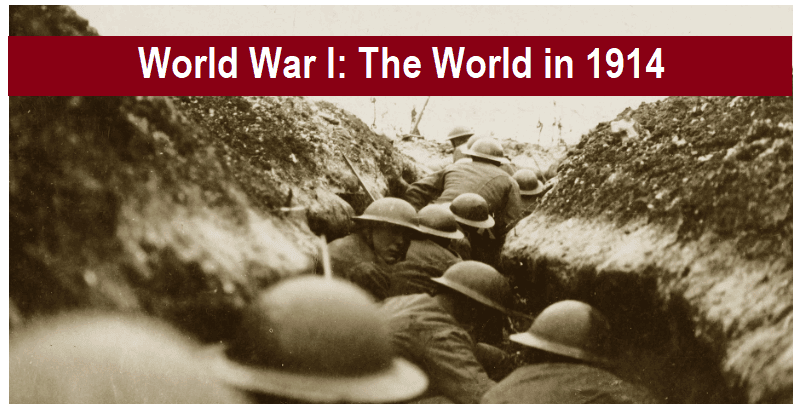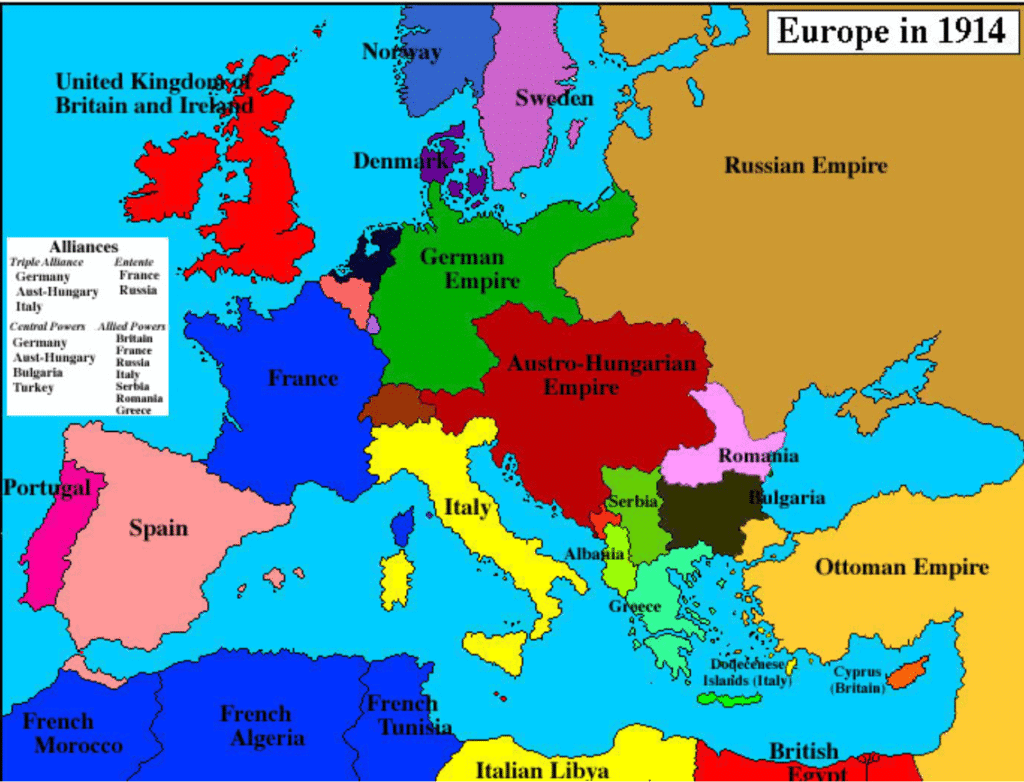World War I: The World in 1914 | History Optional for UPSC PDF Download
| Table of contents |

|
| Europe in 1914: A Snapshot |

|
| The Triple Alliance of 1882 |

|
| England's Shift from Isolation to the Entente |

|
| Causes of Friction |

|
Europe in 1914: A Snapshot
- In 1914, Europe was still the dominant force in the world, with most decisions that affected global affairs being made in European capitals.
- Germany was the leading power in Europe, excelling both militarily and economically. The country had surpassed Britain in the production of pig iron and steel, although it had not yet overtaken Britain in coal production. Other European nations like France, Belgium, Italy, and Austria-Hungary (the Habsburg Empire) were lagging behind Germany.
- Russia's industrial growth was significant but still could not compete with Germany and Britain due to its earlier backwardness.

Industrial Progress Outside Europe
- Remarkable industrial progress had occurred outside Europe in the previous 40 years. By 1914, the United States had become a world power, producing more coal, pig iron, and steel than either Germany or Britain.
- Japan had also modernized rapidly and emerged as a significant power, especially after its victory over Russia in the Russo-Japanese War of 1904-1905.
Political Systems of World Powers
- USA, Britain, and France: These countries had democratic governments where parliaments , made up of representatives elected by the people, played a crucial role in running the country.
- Germany: While Germany had an elected lower house of parliament called the Reichstag , real power was held by the Chancellor (similar to a prime minister) and the Kaiser (emperor).
- Italy: Italy was a monarchy with an elected parliament, but only wealthy individuals had the right to vote, limiting the franchise.
- Japan: Japan had an elected lower house, but like Italy, the franchise was restricted. The emperor and the privy council held most of the power.
- Russia and Austria-Hungary: The political systems in Russia and Austria-Hungary were very different from Western democracies. The Tsar of Russia and the Emperor of Austria (who was also the King of Hungary) were autocratic rulers. Although parliaments existed in these countries, they could only advise the rulers, who had the power to ignore them and make decisions as they wished.
Imperial Expansion After 1880
- After 1880, European powers engaged in a significant period of imperialist expansion , aiming to build empires by seizing territory overseas.
- Most of Africa was taken over by European states during this period, known as the "Scramble for Africa." The primary motives were to gain control of new markets and sources of raw materials.
- There was also intervention in the declining Chinese Empire , where European powers, the USA , and Japan forced China to grant trading concessions at different times.
Emergence of Alliance Systems in Europe
Europe had divided itself into two alliance systems (or two armed camp)
The Triple Alliance (in 1882):
- Germany
- Austria-Hungary
- Italy
The Triple Entente:
- Britain
- France
- Russia
The Triple Alliance and the Role of Bismarck
After the Franco-Prussian War, Germany emerged as the leading power in Europe, while France was weakened and isolated, and Britain distanced itself from continental affairs.
After 1871, Bismarck’s approach shifted from "blood and iron" to a defensive stance aimed at safeguarding the German Empire.
- Bismarck was concerned about a potential French revenge attack, so he focused on creating a system of alliances to keep France isolated.
- This led to the formation of the Triple Alliance, comprising Germany, Austria, and Italy, with the goal of isolating France.
The Triple Alliance of 1882
Austro-German Alliance:
- Russia and Austria had conflicting interests in the Balkans.
- At the Congress of Berlin in 1878, Bismarck had to choose between Austria and Russia and opted for Austria, viewing Russia as an unreliable ally.
- The Austro-German alliance was established in 1879, targeting Russia and France.
Involvement of Italy:
- Bismarck brought Italy into the Austro-German alliance.
- Italy was concerned that France might try to restore the Papacy, and there was also competition between France and Austria over Tunis in North Africa.
- Bismarck exploited these issues to draw Italy into the alliance and further isolate France.
Formation of the Triple Alliance:
- The Triple Alliance of 1882 was formed between Austria, Germany, and Italy.
- This was a strategic move by Bismarck, as it united countries with a history of rivalry.
Formation of the Dual Alliance:
France found an opportunity to form an alliance when tensions arose between Russia and Germany at the Congress of Berlin regarding the Eastern Question.
- France capitalized on this and forged the Dual Alliance with Russia in 1894, which ended its isolation and countered the Triple Alliance.
Armed Peace in Europe:
The Dual Alliance and the Triple Alliance were both defensive in nature, aiming to maintain the status quo in Europe.
- This created a situation of "armed peace," where Europe was technically at peace, but all countries were suspicious and prepared for potential conflict.
- Despite the absence of war, the continental powers were constantly vigilant and focused on military preparations.
Formation of the Triple Entente:
- 1894: France and Russia sign the Dual Alliance.
- 1904: Britain and France sign the Entente Cordiale, a friendly agreement.
- 1907: Britain and Russia sign an agreement, completing the Triple Entente.
- 1902: Japan and Britain sign an alliance, further solidifying these alliance systems.
Tensions between the Triple Alliance and the Triple Entente brought Europe close to war on several occasions since 1900.
England's Shift from Isolation to the Entente
England’s Isolation: Post-Napoleonic Wars, England occasionally intervened in European affairs when it suited her interests but lacked a permanent alliance.
- England's involvement in the Balkan crisis (1875-78) was driven by imperial concerns, particularly the threat posed by Russia in the East, reminiscent of the reasons for the Crimean War.
- Suspicious of the Dual Alliance, England initially sought friendship with Germany.
Shift from Isolation: Imperial interests in Africa and Asia forced Britain to reconsider her isolationist stance.
- The expansion of Russia into Central Asia and the looming threat to Afghanistan led to a near-war crisis in 1885, prompting Britain to reassess her position.
- The British occupation of Egypt strained relations with France, culminating in the Fashoda incident of 1898, which brought the two nations to the brink of war.
Attempted Alliances and Growing Tensions: In 1898, Britain proposed an alliance with Germany and the USA, but Germany rejected the offer.
- Anglo-German relations worsened during the Boer War (1899-1902), with German public opinion being sympathetic to the Boers and critical of Britain.
- Naval competition further strained relations, as Kaiser Wilhelm II's ambition for a German naval presence alarmed Britain, threatening her naval supremacy.
- The development of the Berlin-Baghdad Railway and the prospect of a German naval base in the Persian Gulf heightened British concerns, as these developments challenged her maritime dominance.
Formation of the Triple Entente: In response to these threats, Britain drew closer to the Dual Alliance, first reconciling with France in 1904 through an agreement that resolved long-standing differences.
- This reconciliation was followed by a similar agreement with Russia in 1907, leading to the formation of the Triple Entente comprising France, Russia, and England.
- It is important to note that the Entente was not a formal alliance; Britain was not obligated to support France or Russia in wartime. Instead, it represented a commitment to cooperate on certain issues and reflected a shared distrust of German policies.
Shift in Perception: The formation of the Triple Entente marked a significant shift, with Britain and Russia moving away from Germany and fostering a common distrust of German intentions.
- This shift led Germany to perceive herself as being isolated and encircled by potential adversaries, setting the stage for heightened tensions in the lead-up to World War I.

Causes of Friction
There were many causes of friction which threatened to upset the peace of Europe:
- Rivalry between Britain and Germany: There was naval rivalry between Britain and Germany.
- French resentment: The French resented the loss of Alsace-Lorraine to Germany at the end of the Franco-Prussian War (1871).
- German policy:
- Ambition of Germany: Bismarck was interested in maintaining status quo based on supremacy of Germany as, in Bismarck’s phrase, a “satisfied power.” But with the fall of Bismarck in 1890, Germany’s ambition began to soar higher.
- By 1900: the world had been partitioned among England, France and Russia, but Germany had been left with the smallest share of extra-European possessions. So, from beginning of 20th century, she tried in every direction for possible outlets and means of expansion and everywhere she found the way barred against her. The strongest and proudest of European nations cannot be expected to be left behind in the race for imperial expansion.
- Germany became the chief source of unrest: her vaulting ambitions and visions of world empire may be looked upon as the ultimate cause of the World War I.
- The Germans accused Britain, Russia and France: of trying to ‘encircle’ them. She feared that England can support France in Alsace-Lorraine and Russia in Balkans. Germany thought that all 3 powers, who had divided the great part of the world, came into agreement to prevent the realisation of her legitimate aspiration in the imperial sphere.
- Germany tried hard to break up the Entente: from 1907 to 1914, to strengthen the position of Austria (her only faithful ally in Balkans) and to win over Turkey to her side.
- The Germans were disappointed with the results of their expansionist policies: (known as Weltpolitik – literally ‘world policy’). Although they had taken possession of some islands in the Pacific and some territory in Africa, their empire was small in comparison with those of the other European powers, and not very rewarding economically.
- Russia’s suspicion: The Russians were suspicious of Austrian ambitions in the Balkans and worried about the growing military and economic strength of Germany.
- Serbian nationalism: Serbian nationalism was probably the most dangerous cause of friction. Since 1882 the Serbian government of King Milan had been pro-Austrian, and his son Alexander, who came of age in 1893, followed the same policy. However, the Serbian nationalists bitterly resented the fact that by the Treaty of Berlin signed in 1878, the Austrians had been allowed to occupy Bosnia, an area which the Serbs thought should be part of a Greater Serbia. The nationalists saw Alexander as a traitor; in 1903 he was murdered by a group of army officers, who put Peter on the throne. The change of regime caused a dramatic switch in Serbian policy: the Serbs now became pro-Russian and made no secret of their ambition to unite all Serbs and Croats into a large South Slav kingdom (Yugoslavia). Many of these Serbs and Croats lived inside the borders of the Habsburg Empire; if they were to break away from Austria-Hungary to become part of a Greater Serbia, it would threaten to break up the entire ramshackle Habsburg Empire, which contained people of many different nationalities.
- There were Germans, Hungarians, Magyars, Czechs, Slovaks, Italians, Poles, Romanians, Ruthenians and Slovenes, as well as Serbs and Croats. If the Serbs and Croats left the fold, many of the others would demand their independence as well, and the Hapsburg Empire would break up. Consequently some Austrians were keen for what they called a ‘preventive war’ to destroy Serbia before she became strong enough to provoke the break-up of their empire. The Austrians also resented Russian support for Serbia. Arising from all these resentments and tensions came a series of events which culminated in the outbreak of war in late July 1914.
|
367 videos|995 docs
|














